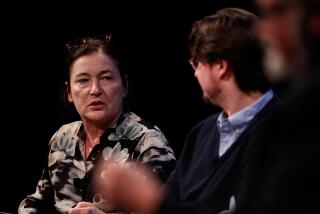A Mind of One’s Own : A professor’s memoir asks: What should students know about their teachers? : FRENCH LESSONS, <i> By Alice Kaplan (University of Chicago Press: $19.95; 222 pp.)</i>
The personal memoir as a literary form has never had it so good. The fall lists of major publishing houses include autobiographical works by all manner of folk, from former British prime minister Margaret Thatcher to former Harper’s editor Willie Morris, not to mention Hitler’s filmmaker Leni Riefenstahl, New York intellectual Diana Trilling, actor Tony Curtis and poets Donald Hall and James Merrill.
Alice Kaplan’s memoir, “French Lessons,” is unique in this company for the simple reason that, unlike the other authors, she is a writer in whose life most readers can have little interest except to the extent that her writing quickens it. In this, “French Lessons” succeeds admirably.
Kaplan, 38, a professor of French at Duke University, is at that stage in her academic career when people begin to substitute “accomplished” for “promising” in describing her. A scholar specializing in the works of French fascist intellectuals, she is a veteran of graduate studies at Yale, a survivor of the reign of critical terrorism who got her dose of deconstruction firsthand from Paul de Man himself. Her book is about the formation of her mind and the realization of her commitment to her professorial calling. It is like a classic bildungsroman , with the curious difference that the protagonist is not an artist contemplating the vocation of art, but a critic contemplating her life and tenure.
Kaplan’s success in “French Lessons” has to do with her invigorating prose--she has, as she puts it, a “staccato Midwestern style”--and with her unflinching honesty. Whether she is writing about personal experience or intellectual history, about the trauma of her first menstrual period or about the semiotic importance of Joan of Arc in contemporary French politics, she is lucid, succinct, matter-of-fact: three adjectives that rarely apply to professors of French literature, those prolix proponents of cutting-edge critical theories, who never seem to have heard of Gallic clarity.
Kaplan writes affectingly about “the privilege of living in translation.” She wants to know why she was so drawn to the study of French, and indeed one distinguishing trait of “French Lessons” is the urgency the writer brings to the task of understanding her own motivations. She writes about a teacher who made a difference at Berkeley, about the lessons she learned from her French boyfriend during her junior year abroad at Bordeaux, about the compulsion to pronounce the French “r” correctly, and the self-abnegation needed to do so. In France, in French, she could be a different person--invent herself anew. French gave her, as she puts it, “a place to hide,” but it was also “a sacred language,” a storehouse of secrets and a mask allowing the wearer to lead a life of pure duality, for which Kaplan has a penchant.
It has been said that English is like a violin, and French like a piano, and that a sonata for the two instruments should prove their incompatibility. Kaplan’s ruminations about difference and discordance, the places where the self gets lost in translation, and the trials and terrors of an American woman striding on French intellectual turf, are memorable. She is a good teacher, making grammar come to life when, to illustrate the difference in nuance between the passe compose and the imperfect tense, she analyzes a passage in Albert Camus’ “The Stranger.”
Activists in the resistance to deconstruction will take heart from “French Lessons,” citing the book as evidence of a return to history on the part of young American scholars. Deconstruction, as Kaplan put it, was an elaboration of the insight that there is “something inherently deceitful about language.” As exemplified in the impersonal ideal of Paul de Man, deconstruction was also “about keeping person-ness away.” There were no characters in literature; they were all linguistic constructs, and language always lies. If you hunted hard enough for that place in any text where the language fatally undermines its own meaning-making power, you would find it. Eat the fruit of deconstruction and you would banish yourself from the realm of verifiable facts and knowable truths.
At a time when most of her colleagues were still working on rhetorical studies in the prescribed manner, describing linguistic circles in which they could chase their tails around the room, Kaplan chose the road not taken. She immersed herself in the study of that shameful period when enthusiastic French collaborationists welcomed the Nazis’ new order, deporting French Jews and persecuting the French Resistance. That Kaplan, whose father was an attorney prosecuting Nazi war criminals at the Nuremberg trials, elected this scholarly course makes perfect sense--especially if you take into account the fact that Kaplan’s father died when she was 8, and that much of her professional career may be defined as a search for a missing father.
This is the journey that she covers in “French Lessons.” It is a journey that required courage, nerve and self-awareness, undertaken as it was before the train of deconstruction finally got derailed. What did it in was the shocking news that the revered de Man had written pro-Nazi propaganda in Europe during World War II. The immediate down-tick in the fortunes of deconstruction was matched by the enhanced value of an expert of French fascist aesthetics: Kaplan was in the right place at the right time and has prospered. Still, having had no inkling of de Man’s fascist past until after his death, she will always regret that she never asked “the questions I could have asked him, had I known to ask.” She is right to exclaim: “What a waste!”
Kaplan’s rejection of deconstruction is far from unequivocal. Although she recognizes the self-serving applications of a critical theory that militates against truth, meaning, history and personality, she insists that “deconstruction was good for us” in the sense that it spawned rigorous techniques for the close reading of texts. Well, maybe. But as one who regards deconstruction as an unmitigated academic disaster, I am bound to side with Guy, the author’s ex-boyfriend from her Yale days. Kaplan reports how he criticized an essay she wrote on the de Man affair: He faulted her for ending the essay with, in her own words, “impossibility and the confusion of theory and life” instead of taking a definite stand.
In “French Lessons,” Kaplan turns the tables on Guy, who had also studied with de Man. “God,” Guy muses, “why did I always have the feeling he never talked to one.” Her cool comment: “At the very moment when (Guy is) trying to say how angry he was that de Man had ignored him, he goes impersonal on his pronoun. Why, after all this time, couldn’t he say, ‘the man never really talked to me’?” Touche. Kaplan wants this episode to demonstrate the value of rhetorical analysis for the revelation of character. It may do that, but it also enables her to dodge--here, as in her earlier essay on the de Man affair--the more pertinent question raised by Guy: What part did de Man’s wartime behavior play in the making of “the cool ironic theorist of language from whom we had tried to learn”?
Kaplan understands the need for factual accuracy but makes a couple of sloppy errors in her chapter on de Man. She reports the rumor that he “married the daughter of a U.S. Senator” but fails to make it clear that the rumor is false. He taught at Bard College, not Bennington, in the late 1940s. An article on the de Man scandal in Newsweek, not Time, provoked the correspondence with the Duke graduate student to which she refers. Small errors, granted: but disturbing in a book with a section entitled “Getting It Right.”
Still, I like this book. I like its intelligence and passion, its candor, all of which helped me overcome my prejudice against memoirs written by people under the age of 40. Above all I like the author’s willingness to put herself on the line. “Now I’m helping my own Ph.D. students write their dissertations, and I don’t want to fail them the way that de Man failed me,” she writes. “How do I tell them who I am, why I read the way I do? What do students need to know about their teachers?” “French Lessons” answers the need beautifully.
More to Read
Sign up for our Book Club newsletter
Get the latest news, events and more from the Los Angeles Times Book Club, and help us get L.A. reading and talking.
You may occasionally receive promotional content from the Los Angeles Times.






